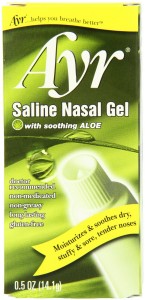By Michael W. Sicard, MD, Charlotte Eye Ear Nose & Throat Associates
It has been a hard, long winter across the country and the consequence for some has been recurring nose bleeds. Socially, for young and old alike, spontaneous bleeding from the nose, or epistaxis, is problematic as well.
Why do you get nosebleeds?
The nose has a brisk blood supply from three arterial systems which merge along the lower aspect of the nasal septum, the midline divide between the left and right sides. Even when not easily visualized, the vast majority of nose bleeds develop along the mucus membrane of the nasal septum just inside the nostril. This area of the septum mucosa is easily traumatized by nose blowing, rubbing the nose and nasal sprays. In addition, the relatively exposed area dries easily particularly in the dry winter weather. Far less commonly, bleeding can develop in the deeper areas or posterior nasal cavity. While rare, underlying bleeding disorders or growths should be kept in mind by the health care professional for protracted difficulties with nose bleeds.
How to stop a nosebleed
The anxiety created by blood flowing from a child’s nose can be significant both to the child and those in the vicinity. Recognizing that increased stimulus is contra productive, it is important to have care givers remain calm and reassure the child as well.
1. Usually, leaning forward to limit blood in the throat is helpful.
2. Applying pressure to the tip of the nose by steadily pinching the tip provides compression to the anterior septum.
3. Refrain from releasing pressure for at least 5 minutes.
4. If available, use of nasal decongestant sprays such as oxymetazalone (Afrin) or neosynephrine are helpful when sprayed directly into the nose or applied on a cotton ball inserted in the nose.
Myth: Pinching the bone along the superior nose, pressing the lip, and ice packs to the neck or nose provide benefit.
Preventative Care
In a very similar manner to chapped lips, a barrier gel will prevent further drying such as over the counter nasal emoliant gels or a spray that are directly applied to the area. Non-oil based gels under the brands Ayr, Rhinaris, and Ocean as well as others can be widely found at the pharmacy. Multiple applications to the nasal septum throughout the day for one to two weeks may be necessary to heal the area and prevent the development of recurrent crusting and subsequent bleeding.
In the event of an acute nose bleed that does not stop or recurring nose bleeds, it is important to seek out care from an otolaryngologist (ENT physician) or your primary care physician.
Nose bleeds do not have to be a recurring childhood stigma or source of anxiety. Seeking out care when conservative care is not enough can remedy this problem and allow our children to enjoy the more traditional activities of winter.
To schedule an appointment with Dr. Sicard or one of our Board Certified Otolaryngologists, please call Charlotte Eye Ear Nose & Throat Associates, P.A. at 704-295-3000 or visit www.goodsenses.com for more information on our services.
Michael W. Sicard, MD
Adult & Pediatric Otolaryngology
Allergy Treatment
Thyroid Surgery
Sinus Disease & Ear Surgery
Matthews Office
Charlotte Eye Ear Nose & Throat Associates

6035 Fairview Road
Charlotte, NC 28210
704-295-3000
Click here for locations.
You can find CEENTA on facebook, twitter, blog & youtube.
![]()
Win a FREE week of Camp from Camp Highlander – a $1,225 value!
Smarties, we are kicking off our Camp Season with an amazing giveaway as a part of our 2014 Smarty Camp Guide! Our Smarty friends at Camp Highlander are giving away one week of camp – Junior II session, June 15-20 (Sunday – Friday) for campers K-4th grade. This is a value of $1,225 – pick me, pick me! Deadline to enter is Monday, 3/15. Click here to register.





